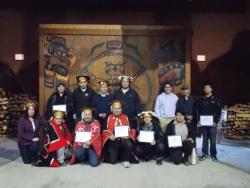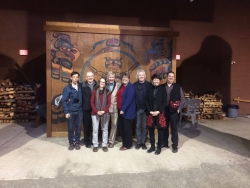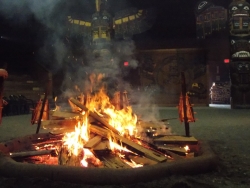The first cohort of students in Vancouver Island University’s Stewardship Technician Training Program graduated with flying colours in March: creating a pathway that First Nations students following in their footsteps can walk with confidence and pride.
“You have to be committed to the course and to finishing it. That was easy with the classmates we had. They kept me coming back to it, all these new friends I made.”
- Stanley Beans, Da’naxda’xw /Awaetlatla First Nation
“Meeting all the people, that was the highlight for me.”
- Shane Pollard, Wei Wai Kum First Nation
“I did fifteen different courses in two years. It was hard work, but they were all good. The Environmental Technician course was the highlight for me.”
- Antonio Billie, K’ómoks First Nation
“If you enjoy the outdoors, and you love the water, you’re going to love doing this. But you have to dig deep. You have to put all of yourself into it. This is not all for you, remember, it’s for our people.”
- Ian McDougal, ‘Namgis First Nation
On March 31 2017, surrounded by their beaming families, loudly clapping community members and proud Chiefs and Councillors, Harry Alfred (‘Namgis), Stanley Beans, Antonio Billie, Cory Frank (K’ómoks), Randy Frank (K’ómoks), Harold Glendale (Da’naxda’xw /Awaetlatla), Jorden Henderson (Gwa’sala-‘Nakwaxda’xw First Nation), Jonah Johnson (‘Namgis), Ian McDougal, Shane Pollard, Tomas Puglas (Mamalilikulla First Nation), Georgina Thomas (Tlowitsis First Nation), Wayne Walkus (Gwa’sala-‘Nakwaxda’xw), and Brandon Wilson (Tlowitsis) all stood up in the Kwanwatsi Big House at Wei Wai Kum First Nation in Campbell River to be acknowledged as the first graduates of Vancouver Island University’s Stewardship Technician Training Program.
Now fully certified as environmental stewards, these men and women—all of them now actively working as Guardian Watchmen and stewards of their territories—began the program in 2015, and spent the next two years in intensive training in a range of disciplines.
The qualifications offered included environmental assessment, technical skills in engine maintenance and data and inventory monitoring, certification in archaeological and culturally modified tree inventory techniques, electro-fishing and parks administration. Not least of all, the courses included cultural awareness and compliance training, involving role-playing scenarios out in the field. “Having that kind of experience, even just through scenarios, really builds your confidence to talk to people and deal with real life situations,” says graduate Stanley Beans.
It’s a huge tribute to the designers of the program that Stanley feels that way; two years ago it was difficult to get two words out of the diffident young man, who was just beginning his studies. Today, he is proud of what he does and he is not shy about saying so: “It feels really good to be out there in the territory taking care of it, and knowing how to do that.”
VIU’s Office of Aboriginal Education and Engagement representative Sheila Cooper, who worked with staff at Nanwakolas Council to develop the program and individual courses within it, says: “The content and scope of the courses were very community-driven. We worked closely with the communities to identify where the needs and desires were for courses that would support the work of the Guardians and the stewards most effectively.”
Chris Roberts of Nanwakolas Council, who worked with Cooper, adds: “It’s a program tailored very specifically for our Guardians and stewards. Cultural awareness training, for example, was uniquely designed for us by elders from different communities. It’s such an important course. Knowledge of customary ways of working and an understanding of the environment from that perspective can’t be taken for granted.”
A day to remember
Hereditary Chief (K’omoks member) Rob Everson attended the graduation ceremony. As sparks crackled and flew from the burning cedar logs in the centre of the Big House, Everson expressed what was in everyone’s hearts and minds: “It’s so important for us as First Nations people to have our eyes and ears on the ground and know what is going on in the territory, to ensure our Aboriginal rights and title are protected, and protecting who we are as a people.”
Four years previously, recalled Everson, “I was on Nanwakolas Council when the Chiefs all decided to do this. We discussed it and we decided that educational training was the best gift we could give to our people.” Looking directly at the students, he told them: “This is the outcome we wanted. It’s a real tribute to the Chiefs that they had that vision, to Nanwakolas Council for pulling it all together, and to you for your incredible accomplishment. This is what it takes for us as a people to move forward in a positive direction. We have to stand up for who we are and work for that, and for our future generations. I hold my hands up to the staff at Nanwakolas Council and VIU, but most of all to you.”
Words of newfound wisdom
Each of the graduates took a moment to share their thoughts and feelings about the program, and advice for those thinking about following in their footsteps. For Harold Glendale, the whole program was great: “I enjoyed everything about it, even being in the classroom because we were learning so much. But it’s something you have to want to do,” emphasized Glendale. “You have to be committed to doing a great job. You have to pay attention and take care with the work. That’s so important. We’re representing our people out in the territory as stewards and Guardian Watchmen.”
Harry Alfred expressed a feeling shared by all his fellow students: “For me the best part has been meeting and working with all the other First Nations. We don’t often have a chance to do that. I’ve made some great friendships that are going to continue past the end of the course. We’re all working for the same goals and I see this as having been the best start for getting there.” Ian McDougal added: “It’s made all of us stronger working together rather than as individuals. We’ve been able to learn from each other and we’re going to keep learning from each other through this great bond we’ve made.”
Jorden Henderson hesitated slightly, then stood up and walked determinedly over to the microphone, grinning with evident delight at being part of the celebration. “I really want to thank everyone who made this possible, Nanwakolas Council, and the instructors for all of their time to be part of this,” said Henderson. “It was really neat going through the program with all of the First Nations and meeting so many new people, and going to so many new places. This has been a really big part of my life for the last two years. It’s a new start for me and I am really looking forward to next year and what’s ahead.”
Pride in the results
Nanwakolas staff are enormously proud of the all of the students, past and present. At the graduation ceremony, Executive Director Merv Child acknowledged the work that Nanwakolas staff Greg Johnson, Scott Harris and Chris Roberts had done to create the program, the partnership with VIU and the financial contributions of the federal and provincial governments, as well as Tides Canada and the Moore Foundation, all of which turned the vision into reality.
Ultimately, however, commented Child, it was the students themselves who made the program succeed: “When I looked at the schedule, you could see how much work you would have to do. It looked pretty daunting, frankly—whole weeks at a time in class, then out in the field, and doing all your other work on top of that. It was a very challenging workload, and you met that challenge and succeeded in graduating, so a big shout out to you guys. That’s an incredible achievement.”
Following in their footsteps
A second cohort of fifteen students have accepted the challenge and are already well on their way to achieving their own certification. Graduate Randy Frank is giving back to the program, providing teaching assistance in the electrofishing and fish survey courses.
The reward will be not only a useful and relevant qualification opening doors to many job opportunities—including the Guardian Watchmen programs run by the First Nations themselves—but an unbeatable experience that the students will remember forever. “It’s been a great two years,” graduate Harry Alfred told everyone in the Big House that afternoon. “I wouldn’t change it for the world.”



